Below is the final part of a four-part guest essay by Richard Cocks about Social Justice. Previously: Part 1, Part 2, and Part 3.
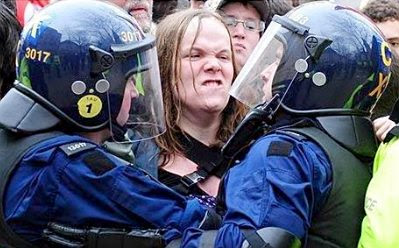
Social Justice: An Analysis
Part 4
by Richard Cocks
Who gets to be a student?
In the 1980s in New Zealand, university students tended to be the children of parents who had also been university students. This was at a time when only five percent of the population was admitted to college. Universities were funded by the government at great expense and reserved for the academically capable. Standards were high, with no grade inflation. Every student was literate and/or numerate and tended to be interested in his studies. Nearly every student pursued his own reading agenda and most would take an interest in classical literature and foreign (i.e., difficult) movies.
This fact about the parentage of university students was presented as a problem.
However, far from being unfair, it only stands to reason. The children of academically successful people are likely to have inherited a higher genetically derived intelligence. They are more likely to be exposed to a larger vocabulary from their parents, along with relatively sophisticated concepts. Their parents are likely to read to them and to treat education as valuable and important. There will likely be easy access to books with frequent trips to the library. The parents are more likely to be exemplary role models in their own reading habits. Academic subjects might be treated as interesting and discussed around the dinner table.
Many of these New Zealand students grew up wanting to be educated and knowledgeable. Some of it was just vanity and fear — not wanting to be the only person at the party who did not know about, say, Freud.
In my own case, long before attending university, “The Academic Calendar,” a bound book in which all university courses were listed along with their reading requirements, would be eagerly examined. Practically salivating at the books that would be read and discussed, fantasies of alternative course loads ensued. Imitating a friend of the family meant wanting from the age of seven to be a philosophy professor, before even knowing what philosophy really was.
The advantages of having university-educated parents were ones of class, family and genetic inheritance. Are those advantages fair? They are neither fair nor unfair. They are certainly an undeserved good fortune a.k.a. luck.
Crucially, what is the alternative to such a state of affairs?
Social justice would require “fixing” these advantages. One problem with this is that a student who is less able, less literate, less motivated, less interested, with a smaller vocabulary, having read fewer books would take the other’s place. This is a poor use of resources and creates its own unfairness. The other problem is that social justice attempts a kind of unknowable counterfactual — one of putting someone where they would have been had not social, familial and genetic factors counted against him. Sowell points out that social justice requires non-existent God-like abilities to determine what might have been.
Unintended consequences of social justice
One thing that was attempted in many countries to try to counteract disadvantages acquired “through no fault of their own” was to take children away from parents who were poor, unemployed, perhaps drug- or alcohol-addicted, unsuccessful, with bad attitudes towards education and industriousness and to put those children in more middle-class and successful households. This happened to Australian Aboriginal children and to Native American children among others. This attempt at cosmic justice is now regarded as an abomination, though it was well-meaning. Ripping such children from their birth home changes their likely educational and employment attainments positively, but destroys families and the parent/child bond. It is now completely out of fashion and widely condemned.
However, the desire for cosmic justice continues in other forms and similar sorts of things result from it.
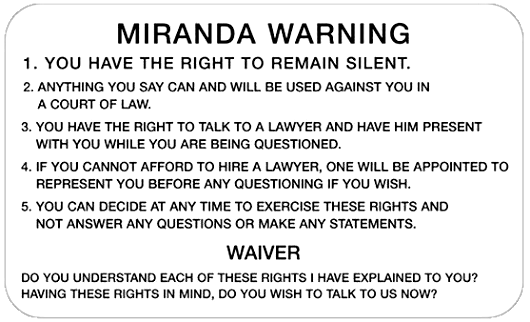
In the 1960s liberal judges argued that amateur criminals often implicated themselves in ways that professional offenders would not. Bizarrely, the judges wanted to even the playing field for the amateurs and instituted the Miranda Rights rule. This means more violent criminals wandering the streets, getting off on technicalities, and more difficulty in prosecuting them. A certain number of extra victims will have died as a result of judges’ wanting amateur criminals to avoid conviction as often as the professionals. Those living in high-crime areas such as inner cities will have particularly suffered, and a very high proportion will have been black. Similarly, justices wanted hard-luck stories concerning murderer’s childhoods to be considered, even though there is no way to tell how much this contributed to their offending. These kinds of considerations mean murder trials commonly extend for three years at great expense, while violent criminals are out on bail.
“Social justice” for criminals means more victims, rapes and deaths, especially among the poor.
Traditional justice means one rule for all. Social justice for vicious murderers means the punishment will vary depending on how bad the killer’s childhood was. This means a different punishment for two criminals who commit the same crime. A criminal who could prove he had a particularly harsh childhood could expect a reduced punishment. Reducing the punishment means there is less of a disincentive to offend. If anything that contributes to his greater chance of offending should mean a lighter sentence, then the rule that criminals with bad childhoods should get lighter sentences will justify giving criminals even lighter sentences, thereby reducing the disincentive to offend, ad infinitum.
Affirmative action programs in California, for instance, were shown to actually reduce the graduation rates of blacks and Hispanics. By putting such students in colleges for which they did not qualify based on their grades, the students found themselves outgunned and at the bottom of their classes. This discouraging state of affairs tends to undermine self-confidence and reduce graduation rates. When the University of California system was forbidden by legal decisions to engage in affirmative action admission policies, the graduation rates of blacks and Hispanics rose by 55%.The number of doctorates among that group in the sciences went up 25% after affirmative action policies were banned. [1]
Affordable housing initiatives, 90% of which are in California, Massachusetts and New Jersey, “increase the cost of housing and limit the supply of new affordable units.”[2] One method involves forcing developers to make a certain percentage of their new units “affordable.” This means selling them at below market rates. This eliminates any incentive to build such dwellings. If the developers go ahead and produce them, in order to stay in business, they will need to charge more for the other houses — thus pricing them above market rates. But who would want to pay higher prices than available for the rest of the market? Pricing the affordable units artificially low mimics the effects of lower demand and pricing regular units at inflated prices will really produce lower demand, thus hurting the entire housing market, reducing the supply of houses overall and thus raising average house prices, which will hurt the poorer most of all.
Price controls for food lead to food shortages as the incentive and reward for food production is reduced. Food shortages will either mean higher prices or the least powerful will go hungry.
Freddie Mac and Fannie Mae were set up to offer mortgages to poor people who could not otherwise afford them and would not qualify due to poor credit ratings, etc. Giving a mortgage to someone who cannot afford it is not really doing that person a favor. Although not officially government-guaranteed, these mortgages were frequently regarded as though they were. Thus, there was effectively a government intervention distorting the market. Mortgage lenders went ahead and offered loans to those who could not afford them and these mortgages were sold in bundles with good loans mixed in with the bad. Yes, it was crummy behavior on the part of finance companies, but without the implied government backing of the loans, there would have been nothing to exploit. The result was government bailouts and the near-collapse of the banking system on a worldwide scale.
Black progress educationally and in employment actually declined in the age of affirmative action compared to equal employment opportunity policies and even before EEO policies.[3]
Reformers in the nineteenth century, comparable to modern SJWs, fought against the existence of slums for immigrants. Some of these slums housed several men in one room. It might seem as though the reformers were doing something good. However, what they were actually doing was harming the options of the slum dwellers. Slums are cheap, and in many cases the immigrants had actively chosen their housing conditions to minimize cost. Many of the Eastern European immigrants were fleeing persecution, and their lives were in danger. They needed to save money to pay for transportation to America. Irish immigrants also needed money to bring family members out from Ireland to avoid starvation due to the potato famine. Poor Jews commonly saved their money via cheap accommodation for a better future for their children. Sometimes the money saved on rent was needed just to buy food.

The reformers had good intentions, but by being interfering busybodies they were actually harming many of the people they intended to help, who ended up being evicted from their dwellings precisely because the apartments were considered slums.
Slum clearance to this day does not result in poor people living in wonderful accommodations. Instead, gentrification simply prices the poor out of that market and forces them to relocate. Many poor people, thanks to cultural habits that have contributed to their poverty, will in fact turn whatever accommodation they have into slums by their own behavior. Then what?
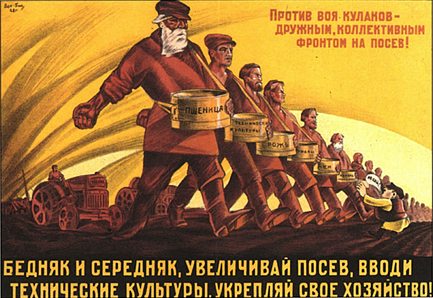
When communists collectivized farmland, farm production plummeted. The Soviet Union and other communist regimes managed to convert countries that had plentiful food to countries suffering from food shortages and starvation.[4] Small private plots of land, which were permitted to a limited extent, produced an outsized proportion of the food produced. Rights to private property benefit everyone, not simply the possessors of private property.
Likewise, primogeniture, the inheritance of farmland by the eldest son, is not fair. However, if farmland is repeatedly divided among multiple children, especially across several generations, the resulting tiny plots are insufficient to sustain anyone. In this case caring only about justice would result in economic ruin and starvation. There are also economic efficiencies in farming larger plots of land. The eldest son traditionally has some responsibility to look out for his siblings and the whole family will be better off by following this unequal distribution of land.
Justice is just one virtue among many. If there were only 200 life vests for 300 people, justice might demand that all drown. Most people would instead vote for using the life vests even while knowing that the more selfish people would probably prevail. Likewise, if a tax rebate were denied and an author knew he had the documents to prove the IRS was wrong, but had a very limited time frame to appeal the decision, he might give up collecting his rebate, which he is justly owed, if it meant canceling his book tour.[5]
Stifling success
The rage for equality has led to moral and cultural relativism — no culture, behavior, books, being considered better than any other. So-called black English is taught as being as good as standard English, even though the professors who teach this can themselves write grammatically correct standard English. Black English condemns the student to being unemployable in any profession requiring the ability to write well. Sowell writes that well-behaved students in high school are asked to listen sympathetically to the ideas on behavior of delinquents and ne’er-do-wells and face condemnation from their teachers if they demur.[6]
Where all achievement is regarded as the result of privilege, then the disadvantaged are given no incentive to imitate the behavior of high achievers. If the deck is stacked against someone, only a sucker continues to play by the rules. There is the danger, often realized, that the successful will be regarded as class traitors and sellouts. To adopt a positive approach to education will then be regarded as “acting white.” Similarly negative attitudes towards education may be found among white working-class children in the UK, where race is not a factor.
In those cases where social justice advocates guarantee not opportunity, but results, then the beneficiaries know the usual rules do not apply to them, once again reducing the motivation to actually change behavior. This is the case with many black students who plan to attend graduate school.[7] Why work if it is not necessary?
A professor was pressured to pass a black student some years ago at a Central New York college. After detailing all the steps he had taken to help this student, who adopted a rather ingratiating manner in his office and an outrageously bored and non-cooperative attitude in the classroom — refusing to take notes, scowling and leaning against the wall while apparently trying to sleep, but mostly signaling his disgust at having to be there — the professor was informed that “you will deal with this” or some such strange linguistic formulation. It was not a request, but a vaguely-worded command; simultaneously clear in its implications and verbally opaque. The head of the department could presumably deny any imperative aspect to what she had said if need be. If this student thought the rules did not apply to him, he was correct.
Equality in education leads to lower standards and higher grades, so the less able need not feel badly about themselves. Poor students suffer more from this because the richer students are more likely to have access to books and educational resources at home, plus they have parents who are more interested and engaged in the students’ learning.
One fourth grader who surpassed twelfth graders on the SATs in mathematics was refused harder math assignments by his principal in the name of “social justice.”[8] Likewise, including the mentally handicapped and unusually gifted students in the same class in the name of “mainstreaming,” also emphasizing equality, puts enormous strains on teachers. Often most resources are put into slightly raising the standards of the sub-mediocre imperceptibly rather than into the training of the highly gifted who could benefit the most from the extra attention. This means other members of society lose the benefits of what those highly gifted students might otherwise have attained.
Military deterrence vs. summit meetings
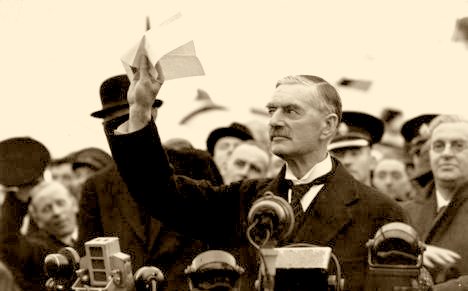
Sowell extends his discussion of the quest for cosmic justice to matters of war. Social justice advocates are likely to belong to or feel sympathetic to “peace groups.” The idea is that dialogue to eliminate “misunderstandings,” summit meetings and peace talks are the way to avoid war. Heightened emotions are thought to cause war rather than rational decisions to attempt to gain territory or glory. Bertrand Russell and others like him thought that the actual existence of armaments led to war. But in fact Hitler and Mussolini were well aware that what eventually became the Allies were poorly armed, and imagined they had no real will to fight, leading the Axis powers to declare war.
Neville Chamberlain spoke scornfully of arms races where an advance on one side is immediately cancelled by an advance by the other, with no net gain. Sowell points out that what Chamberlain failed to notice was that if one country increases its militarization, it is in the interests of countries that might be invaded to similarly increase their armaments. Doing this may create no net advantage, but it will be a deterrent to the potentially belligerent country. Matching the level of armaments of a potentially hostile enemy is not of “no use” if it helps to avoid war. Sowell argues that if Winston Churchill’s calls for Britain and other countries to arms themselves in the 1930s had been heeded, World War Two might have been avoided.[9]
Between the two world wars there were plentiful peace talks and summit meetings and pacts not to attack, and they did nothing to stop WWII. Having a strong military as a deterrence is the best defense. However, social justice warriors are likely to be fans of disarmament and summit meetings, and to consider the military deterrent camp not just wrong, but evil. The military deterrent camp might well be right about the best means of achieving peace, but, Sowell comments, only one side calls itself the “peace movement.”[10]
As a dual citizen of New Zealand and the USA, I am aware that NZ is safe, probably, only as a result of the likelihood of America coming to its defense; certainly not because some treaty was signed.
Overturning the American Revolution
What was distinctive about the American Revolution, Sowell argues, is that it was concerned to limit the top-down exertion of power. It gave the ordinary person the ability to veto decisions by the rulers and provided mechanisms for replacing those leaders. Most white people who emigrated to the US were indentured servants, with very few aristocrats, and most black people were slaves, so the American Revolution was quite a victory for the hoi polloi.[11]
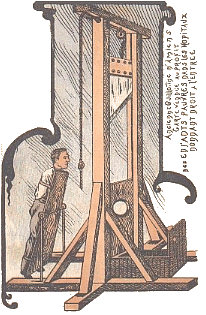 Other revolutions, such as the French and the Bolshevik, focused on installing regimes regarded as “right thinkers” with the preferred doctrines, rather than restricting the power of the ruling elites. The French Revolution included “Representatives on Mission” who could “correct” any injustices as they saw fit, overriding local laws and representatives; even carrying their own personal guillotines for carrying out their idiosyncratic ideas of justice.
Other revolutions, such as the French and the Bolshevik, focused on installing regimes regarded as “right thinkers” with the preferred doctrines, rather than restricting the power of the ruling elites. The French Revolution included “Representatives on Mission” who could “correct” any injustices as they saw fit, overriding local laws and representatives; even carrying their own personal guillotines for carrying out their idiosyncratic ideas of justice.
The American Revolution, contrariwise, was more skeptical about human wisdom and focused instead on minimizing tyranny. The power of Congress to interfere in the affairs of its citizens was to be very limited. The default position was that Congress could not do anything it was not expressly authorized to do, while private citizens could do anything they were not expressly forbidden from doing. Constitutional rights are protections from government interference. The Tenth Amendment states “Powers not delegated to the United States by the constitution, nor prohibited by it to the States, are reserved for the States, or to the people.”
The rule of law that arose makes free markets and other interactions between citizens predictable and stable. The rules are known in advance and plans can be made accordingly. Best of all, perhaps, is that they are the same rules for everyone.
Social justice, however, allows unelected judges and others to impose their vision of how the world ought to be. The unwashed masses are not to be trusted to manage their own affairs, but must be second-guessed by liberal, “educated” elites.
To that end, Congress has found ways to extend its powers by attaching conditions to federal subsidies. To refuse these subsidies is to be put at a severe disadvantage. Educational institutions and healthcare providers who accept subsidies then have rules imposed on them by the government. Le Moyne College, for instance, an ostensibly Catholic institution, is not allowed to conduct prayers in most places on campus for that reason.
Another method is for judges sympathetic to the extension of centralized power and to the supposedly superior wisdom of the elite to which they belong to rule that practically everything is a matter of “interstate commerce,” which provides another means for governmental interference.
Social justice tries to produce economic equality at the expense of massive concentrations of political power, i.e., by increasing political inequality. And by definition, this power is to be exerted by a liberal and progressive elite, who imagine they know better how the affairs of man should be regulated in order to produce a universe more pleasing to their cosmic vision. If excessive taxation drives out entrepreneurs, investment and employers, the resulting income distribution is likely to be more equal, pleasing the visionaries. The fact that employment, the economy and the general standard of living is markedly reduced is the price paid for pleasing social justice warriors.
Medieval European kings gave up the ability to control prices and instituted free markets in order to attract superior craftsmen and merchants. Inferior producers like a fixed price. The superior, however, can expect higher prices. The king could then tax the resulting free market transactions and bolster his own political power. Of course, it was a deal with the devil as far as he was concerned, because he had to give up power to maintain power. Such a king had more money to fund armies for both defensive and offensive purposes. He could not afford to maintain his power over the economy. Few kings if any wish to give up power, but they often had no choice. Free markets produced a new class of rich merchants who superseded the landed gentry and who demanded political power to accompany their new economic power.
Therefore free markets played an important role in limiting tyrannical power, and thus in producing freedom. Political freedom is the freedom to live life with the minimum of interference by the authorities, and to conduct transactions with one’s fellow citizens as an individual sees fit.
Social justice represents a return to centralized power wielded by overlords who are convinced they know better. If they are wrong, there is no mechanism to correct them. And even imagining counterfactually that SJWs were right, life is more fulfilling and rewarding if lived by a person’s own lights. Part of freedom is the freedom to make mistakes and not having to justify decisions.
Visionaries are the new tyrants. Lenin, Mao and Pol Pot were all visionaries determined to mold the populace to their vision and to kill and suppress those who did not fit. Convinced of their moral superiority, they did not let little things like facts and misery curtail the implementation of their visions.
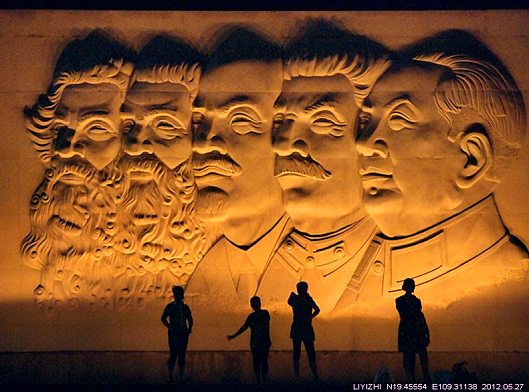
Social justice gives politicians and judges the ability to select beneficiaries and victims, turning both into supplicants, using the people’s tax money in the process.
Actual justice requires the rule of law; the same rules for everyone without regard to race, class, ethnic background, religious belief or lack of belief, etc. For this, no supernatural knowledge is required. Social justice, on the other hand, means “let me know the color of a person’s skin, his class and sex, and we will let you know what his rights are.” The former creates a relatively orderly predictable society. The latter is an unpredictable mess. Day-care centers, for instance, must hire people with mental illnesses. These people must then be “reasonably accommodated.” However, what counts as reasonable accommodation cannot be known until some judge arbitrarily decides what that will be. The other question that arises is to ask why the day-care provider must be asked to bear the cost of dealing with the problems of the mentally ill. These costs might include financial and organizational problems. The mentally ill are to be made whole again via preferential treatment not extended to other employees.
Similarly, the notion of a “hostile working environment” is largely subjective. An employer might find out what it means only after the fact and at the cost of millions of dollars. No ill intent is required to be found culpable.
The fact is that attempts to create social justice do not necessarily actually reduce inequalities, and frequently hurt those they are intended to help.
Conclusion
Sowell ends by writing that unbridled governmental power is a great evil afflicting many countries. The Tenth Amendment was meant to strongly limit this power. Yet SJWs are not content with it and have eroded it through “strings attached” government subsidies for highway building, hospitals, schools, university research, urban redevelopment, and adoption agencies, among other things. SJWs tend to disdain the average person and his life choices. The many are regarded as the deplorables. The idea that people should be largely left alone to live the lives they have chosen, mistakes and all, is not appealing to SJWs. Current society with its traditions and customs will never be appealing to SJWs, partly because sanctioning current rules and traditions would forestall their role as visionaries and imaginary saviors of the oppressed and victimized, and partly — since their ideas are usually not subjected to empirical verification — their imaginary ideal world will always be better than the messy, imperfect real world. Imaginary worlds do not come with costs and trade-offs, and reality can never compare to second reality perfection.
Richard Cocks is a commentator whose work has been published by Orthosphere, Sydney Traditionalist Forum, and University Bookman.
Notes:
| 1. | Richard H. Sander and Stuart Taylor, Jr., Mismatch: How Affirmative Action Hurts Students It’s Intended to Help, and Why Universities Won’t Admit It, New York: Basic Books, 2012, p. 152 and p. 154. | |
| 2. | Paul Kupiec and Edward Pinto, “The High Cost of ‘Affordable Housing’ Mandates, Wall Street Journal, Tuesday, 2/13/2018, p. A17. | |
| 3. | Sowell, The Quest for Cosmic Justice, p. 42. | |
| 4. | Ibid, p. 134. | |
| 5. | Ibid, p. 29. | |
| 6. | Ibid, p.76. | |
| 7. | Ibid, p. 40. | |
| 8. | Ibid, p. 84. | |
| 9. | Ibid, p. 116. | |
| 10. | Ibid, p. 101. | |
| 11. | Ibid, p. 187. | |

“The American Revolution was quite a victory for the hoi polloi.”
Really? Slaves didn’t have the vote, were there property qualifications for voting rights? The USA was founded as a slave-owning oligarchic republic, not a democracy.
The American Revolution was a victory for the agrarian freeholders who fought in the War for Independence. The Founders kicked the can of slavery down the road to the next generation (or so) in order to gain Southern support; they needed it for trade. Aside from slave-holding states there was little support for slavery, which was seen as odious.
See de Tocqueville’s second volume of “Democracy in America”.
Did I get Charles M. Baird wrong? I learned that the southern agrarians were most loyalist to the british rule and that the capital owners (G. Washington) and traders of the north – east were the motors of the American Revolution because their fortune was not land but rather bonds of the over-endebted british crown. First goal was,acc. to Baird, to save their assets by means of an own currency.
It’s true that the South was more loyal to the British, up to and including the Civil War.
But agrarians in the north quickly built up fortunes in trade and later manufacturing ; the South was always behind in that regard. As much a function of climate as anything.
It was the Northern traders who brought over the slaves to the upper South – along with the Brits, until the latter outlawed it when the trade was no longer profitable to them.
Neither side had all the virtue.
Washington’s belief in land certainly grew out of his early life as a surveyor. He did amazing work.
It doesn’t make sense to me. You’ll have to detail your point.
In your comment, you claim that the primary drivers of the American Revolution were protecting their forturn in British bonds. How did creating a revolution make their bonds any more valuable, preserve their value, or make the British issuers of bonds any more likely to honor their bonds? Very confusing.
In fact, one Jewish banker, Hayim Solomon, threw his entire fortune into supporting George Washington and the Continental Army, bankrupting himself in the process.
Now, if your claim is that the sponsors of the American Revolution wanted their own currency, apart from the British currency, it makes sense. As Stefan Molyneux points out in many of his videos, notably his video with Lawrence Reed on the Great Depression,
https://www.youtube.com/watch?v=2Ce6z-u_Wk0
the power of a central bank to monopolize the issuance of currency is a strong predecessor to massive hidden taxation by the government. The American colonists could quite conceivably have been infuriated by the British control over the colonys’ currencies for the benefit of the British treasury.
I don’t know. You brought up the ambiguous claim, so perhaps you could clarify it.
Also see Paul Johnson’s book on American history. He’s very erudite and most entertaining. And he *likes* America.
A History of the American People
https://amzn.to/2NEw5KK
There are used copies also.
Paul Johnson is, regrettably, a brilliant, but soon to be extinct, author and commentator. Reading his “Modern Times…” and other works consolidated my weltanschaung in the 1980’s. There is unlikely to be any replacement of him. Sadly.
Britain will continue to produce good historians. They will arise as he did, singly, and outside the rotting walls of academe. While the latter looks down its nose at “popularizers” like Paul Johnson, the PJs of the isle make a good living.
Qne should put slavery into context, it is the normal state of mankind throughout history apart from the small glitch in the recent few centuried when the bible became an important and commonly read document.
A central feature of this document is a deity who brought a people and their friends (many Egyptians took part in the Exodus) out of Slavery.
The British broke the international slave trade in the 19th century, and America eventually changed its social order to exclude absolute slavery (but not indentured ‘slavery’) following a terrible war, where the object was more to break the economies of the Confederate States rather than for any benevolent motive.
I understand your argument, slavery was widespread, and still is outside the West. However I don’t think that context, in this case, is relevant. Any state that supports slavery is not a democracy in the modern sense. One could argue that the US was evolving towards a democracy, whether it achieved the state, before other countries is of course a different question.
While the Constitution was a white Christian male orientated document, it was also a very profound move in the right direction, it was the nascence of the idea of liberty for all
As I understand it, MC, there is no historical evidence for the Israelites’ enslavement in Egypt or subsequent “Exodus”- unlike that for their later historical homeland being in, roughly, the “Holy Land”.
But it’s in the book mentioned as a central theme and the influence of the book is profound and fundamental to Western Civilization. It does not matter if there is no historical evidence (there is if you know where to look for it)
As far as slavery, in the context of the Federation, the question of slave ownership was left to the individual states. The philosophy of federalism was that the central government had enough power to protect the country against foreign aggression and to prevent armed conflict between states, but not enough power to usurp the existence of states as sovereign entities with respect to their own citizens. So, the Bill of Rights limited the federal government, but not, as originally intended, the state governments.
In my opinion, though the issue of slavery provided a lot of the emotion, secession was really about regional differences. The North was industrial and increasingly urban; the South was agricultural. The representatives of the states and regions had to regularly fight out their differences in the Congress, on such important topics as tariffs. The South was able to ward off high tariffs (prior to diluting their influence through secession) but just barely. It was only after southern states had seceded that the North had enough votes to pass a truly high tariff.
In my opinion, the South seceded mainly because the Southern political class got tired of fighting the regional battles all the time against a region (the North) that did not share their interests. There was not a mainstream Northern politician who made any threats at all against slavery in the South. Why would the South care if slavery were allowed in the new territories, all other things being equal?
Also in my opinion, and I’m taking a stretch here, there is no way slavery would have existed in the South after about 1880. I would make this claim, even if the Confederacy remained in existence. The south was headed by literate men, well-versed in the classics of civilization. Most likely, the Confederacy would have simultaneously allocated funds to pay off slaveholders to remit their slaves, and loosened the enforcement of slave holding. Eventually, even the most recalcitrant of slave holders would see the handwriting on the wall.
I think the North American region would be far stronger today if the Confederacy had remained in existence. You’d have more uniform regions as political units, negotiating with each other, rather than a collection of completely different interests trying to negotiate legislation covering all regions. I doubt if anyone today would claim the US would be stronger if the invasion of 1812 had succeeded, and Canada were part of the US.
You can’t treat people based upon their class because there are too many classes. Just think: the class of obese native Americans who have IQs above 140; the class of Type II diabetic black students who come from families with annual income over 150 thousand….ad infinitum.
William
[Assume an anatomically impossible position]
We are not all obese in here.
This perceptive essay is excellent. It leaves an unarguable lesson:
Socialism does not work.
“When the University of California system was forbidden by legal decisions to engage in affirmative action admission policies, the graduation rates of blacks and Hispanics rose by 55%. The number of doctorates among that group in the sciences went up 25% after affirmative action policies were banned. ”
This is powerful stuff to know. Thank you.
If California got it wrong on “affordable” housing, was it not because of not providing modest “starter homes” so people could get a foothold on the ladder of home ownership? Also there will likely always be those cannot ever afford to buy (I’m one), requiring subsided homes for rental, whether provided by local authorities or philanthropic organisations (an American, George Peabody, founded one here in London in the 1850s which is still going strong).
If California got it wrong on “affordable” housing, was it not because of not providing modest “starter homes” so people could get a foothold on the ladder of home ownership?
Homes are affordable if you’re willing to live in the semi-arid interior (some of it not so “semi”). A complicated subject having to do with how the elite coast stole water under the guise of green casuistry, robbing other parts of the state.
California’s climate, in general, was never meant to sustain its current level of population. Florida, either. Those devastating forest fires in the former are at least partly due to lousy timber management. In the latter, sinkholes develop when the land is over-built.
Meanwhile, California’s crowding, crime, homelessness, poor roads, and health hazards are causing it to lose its middle class. Those on either end of the spectrum don’t care.
Mark H, But how would California, or any government, provide modest starter homes without forcing developers to operate outside of a free market?
If some developers can make money building low cost homes in a given market they will do that without anyone forcing them. Other developers may decide to build more expensive homes. If people with low incomes can’t afford even the lowest priced homes in that market that simply means they can’t afford to live in that area.
The local real estate market, through supply and demand, will always set the price of property. If the government coerces developers (or taxpayers) to operate outside of the free market price in a given area then we’re now describing a socialist economy. As Richard Cocks explains, price controls are a bad idea.
For Mark H
Here is the question. If you can’t afford a house in a particular region, why is there an obligation for a government to tax productive people who are, in fact, able to afford such houses, and grant you the funds to live in an area too expensive for your income?
The obvious solution is for you to move to a region more in line with your income. Many, many Californians moved to Texas, Arizona, Nevada, etc, even before the massive immigration and crime wave. Why are you entitled to state funds for a “starter” home? You could work for it like those who relocated: move to a cheaper region, get the cheapest housing you could, save your money, and come back when you had enough for a down payment.
It’s a bit late, RonaldB; I’m 70, but fortunate to have one of the dwindling number of local authority homes.
More generally, recruitment of even essential workers in cities, such as nurses and teachers (I worked mainly in retail), is increasingly difficult as they cannot afford to live there, while even the countryside is becoming depopulated for the same reason.
Call me a socialist if you like (more an old fashioned liberal really), but affordable housing should be treated as a basic necessity like healthcare and education.
For Richard Cocks.
Thanks for your large and expository essay on the Social Justice Warriors.
I myself take a more jaundiced view on them. It’s true they latch onto concepts like “equality”, “racism” “bigotry” to justify their actions. But, the root of their philosophy is to gain political power.
The road to political power is through the disruption and destruction of the current social order and the natural organization that peaceful and productive people form among themselves. There are two cutting-edge forces today pushing this objective: cultural Marxism and Islam. Cultural Marxism and Islam will eventually turn on each other and the Islamists will win, annihilating the cultural Marxists, but that is far in the future. For today, they share the same objectives and employ many of the same methods.
It is an integral part of Islamic war doctrine to destroy the confidence of non-Muslims in the ability of their government to protect them. You can read this very directly in Malik’s “The Quranic Concept of War”. It is also a basic principle of cultural Marxism that the current culture and social order must be destroyed. It’s not well known, but the deep-down cultural Marxist philosophers were experts in advertising and communications. Adorno and his colleagues made millions developing methods of influencing public opinion and consulting for advertising.
The principle of destruction is a way to explain the fact that feminist organizations ignore the actual, ritual genital mutilation of small girls, but become seemingly enraged at a groping that may or may not (most likely didn’t) have happened 35 years ago.
The point of destroying society is to allow a new elite to take charge. Generally, with Marxists, the elite is a highly verbal class of people who can write an essay but “can’t park a bicycle straight”. With Islam, of course, the elite is the class of Imams, and other Islamic scholars who exert huge authority over Muslims.
Thank you Mr Cocks for a magisterial four part essay. And thank you to the proprietors of GoV for publishing it.
One, peripheral (though in some way fundamental) quibble that I have is with this assertion:
“As a dual citizen of New Zealand and the USA, I am aware that NZ is safe, probably, only as a result of the likelihood of America coming to its defense”
As most of my Australian-born family moved to “Enzed” in the 1970’s and I subsequently visited NZ very frequently, I have a great deal of insight into the mindset of a cohort of “progressive” New Zealanders. Mr Cocks’ statement above is a widespread assumption in NZ.
When NZ Prime Minister in the mid 1980’s, David Lange, demanded (to much local “progressive” popular acclaim) that visiting US naval ships declare if they carried nuclear armaments or not, a rupture in the Anzus treaty developed. A sister in law of mine explicitly assumed that, in the event of, say, a Chinese invasion, of NZ the USA would come to the rescue., I asked: why would the USA do that? Her answer was that NZ was a Western country and the first country to give women the vote! There is a mentality that when push comes to shove, the States will step in and be the good guy policeman. Why?
Donald Trump is working hard to bring China down to size. But our Navy isn’t big enough to patrol the Pacific. NZ had better hope that Australia is working toward muscling up its military.